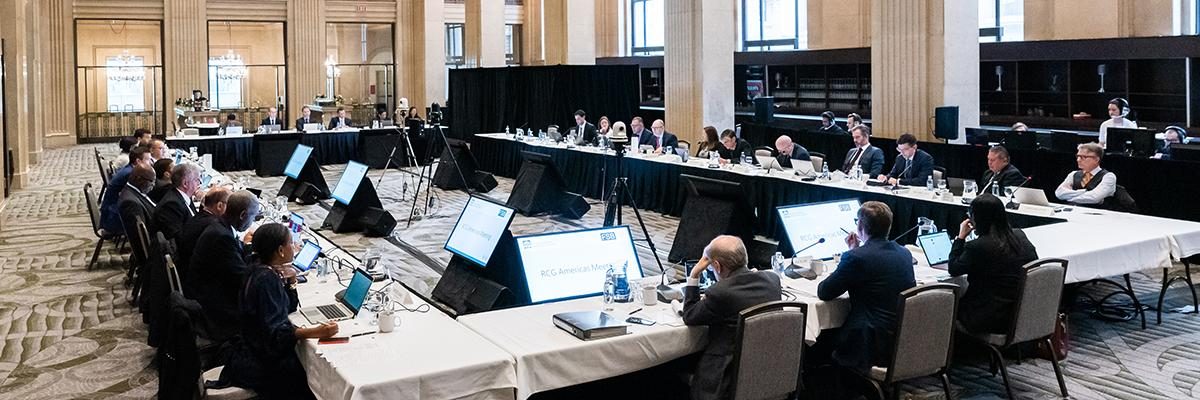
Global engagement
The Bank of Canada and its international counterparts faced important policy challenges in 2023. Most notably:
- Inflation remained too high in many countries, and the persistence of underlying inflation suggested that global interest rates may need to be higher for longer. This increases the risk of financial stability challenges ahead.
- The global economy and financial system were adjusting to the higher interest rates needed to combat inflation. This raised concerns about hidden risks, such as the stresses in the banking sector that emerged in March 2023.
Meanwhile, Russia’s war against Ukraine continued, and conflict in the Middle East reignited. Broader geopolitical tensions were heightened, and signs of geo-economic fragmentation increased.
Combined with structural forces such as climate change, the potential lasting effects of these challenges suggested that economies needed to prepare for more volatility and more frequent supply shocks.
Against this backdrop, the Bank used its influence to emphasize several points:
- Central banks must continue their efforts to bring inflation back to target—otherwise, existing challenges will be amplified.
- Central banks have the tools to help fight inflation and maintain the stability and resilience of the global financial system.
- Monetary, fiscal, structural and trade policies must work in the same direction and not at cross-purposes.
- Effective and legitimate multilateral institutions are essential to the sound functioning of the international monetary and financial system.
Exchanging information to combat high inflation
Governor Macklem and other central bank governors discussed inflation through such forums as the Bank for International Settlements, the International Monetary Fund (IMF), the G7 and the G20.
Overall, central bank governors agreed that higher interest rates were having the desired effect of helping rebalance demand and supply and ease inflationary pressures. They also noted that inflation was coming down without provoking recessions or large increases in unemployment. But many shared the concern that core inflation was persistently high and that this was preventing inflation from returning to targets.
The Bank engaged with its international counterparts to help identify and disentangle the common global forces that are affecting the evolution of inflation in their respective countries. This allowed central banks to craft policies that more fully integrate the risks to inflation from global factors.
In their joint communications to the public, such as G7 and G20 communiqués, Governor Macklem and his international counterparts reaffirmed their shared commitment to restoring price stability.

Governor Tiff Macklem (right) at the Annual Meetings of the Boards of Governors of the World Bank and the International Monetary Fund in Marrakesh, Morocco in October.
Evolving the international monetary and financial system
The Bank continued to advocate for changes to the international monetary and financial system, building on the vision Governor Macklem had set out in a 2021 speech. The need to make the system more resilient, agile and inclusive, with open trade and investment, became even more pressing in 2023.
In this context, the Bank used its annual economic conference to bring together academics and policy-makers to chart a way forward for the international monetary and financial system. The conference looked at how institutions can use policy to navigate a global environment that is more prone to shocks than in the past. Some key takeaways from the discussions:
- The international monetary and financial system has been resilient so far but will continue to be tested.
- The system needs to adapt to ensure it has more buffers, or that buffers are better allocated and more efficient.
- A resilient global financial safety net requires a strong IMF.
Promoting resilience across borders
The resilience of the global economy and financial system remained a key area for collaboration in 2023.
Responding to climate change and global supply chain challenges
Under Japan’s G7 presidency, the Bank of Canada and its G7 central bank counterparts committed to better understanding both the near- and the long-term macroeconomic implications of climate change, including those for monetary policy. These include:
- the impacts of different policies to mitigate climate change
- any cross-border or spillover effects that might arise due to countries’ different objectives and approaches to addressing climate change
The Bank advocated strongly that central banks’ core mandates of price and financial stability are important prerequisites for an orderly transition to net-zero greenhouse gas emissions.
The G7 Finance Ministers and Central Bank Governors also discussed how to build resilience into global supply chains. They considered:
- lessons from the COVID-19 pandemic and Russia’s war against Ukraine
- potential bottlenecks that could occur as companies around the world work to develop the green supply chains needed to support a successful climate transition
The Japanese G7 presidency launched the Partnership for Resilient and Inclusive Supply-chain Enhancement to help emerging market and developing economies increase manufacturing of clean-energy products and boost their participation in the minerals industry.
Regulating cryptoassets for a more resilient financial system
The Bank helped the Indian G20 presidency reach consensus on an important roadmap for regulating cryptoassets. The IMF and the Financial Stability Board (FSB) collaborated on this work, integrating macroeconomic and regulatory perspectives while considering the risks specific to emerging market and developing economies.1
The Bank was an active participant in multiple FSB working groups focused on cryptoassets. In addition to its other contributions, the Bank helped shape the FSB’s high-level recommendations for the regulation, supervision and oversight of both cryptoasset activities and markets and global stablecoin arrangements.2, 3
In 2023, Governor Macklem’s term as co-chair of the FSB Regional Consultative Group for the Americas was extended. This forum facilitates dialogue between members and non-members of the FSB. It also plays an important role in promoting the adoption of FSB recommendations among non-members, reducing the potential for regulatory arbitrage.
Supporting funding markets through financial stress episodes
During the episodes of stress in the Swiss and US banking sectors in March 2023, the Bank of Canada and five other major central banks announced a coordinated action to improve the provision of liquidity in global funding markets through swap lines.4 Swap lines between central banks are standing facilities that serve as an important backstop to the global financial system during periods of acute market stress.
Facilitating cross-border payments
Working closely with colleagues at the FSB and other international organizations, the Bank continued efforts to make cross-border payments cheaper, faster, more inclusive and more transparent than they are currently.
After the G20 roadmap on cross-border payments was published in 2020, the international community’s focus shifted to its implementation. This requires close collaboration between the public and private sectors. In 2023, the FSB created a new task force focused on legal, regulatory and supervisory matters. The Bank’s Senior Deputy Governor Carolyn Rogers chairs this task force, which is charged with facilitating dialogue with private-sector entities.
Looking forward
In 2024, the Bank will:
- work closely with its Italian counterpart to support Italy’s 2024 G7 presidency and ensure a smooth transition to Canada’s G7 presidency in 2025
- continue to work with its international counterparts to assess the current and future risks to global growth and the evolution of global factors behind inflation
- strengthen partnerships to deepen the Bank’s understanding of how Canadian and global economies are affected by climate change and how central banks can deliver on their core mandates through the transition to net-zero carbon emissions
- support international efforts to strengthen the prudential regulation of banks and push for coherent international policy frameworks for digital assets and payments
More information
No two ways about it: Why the Bank is committed to getting back to 2% (remarks by former Deputy Governor Paul Beaudry)
The International Monetary and Financial System: Current and Future Challenges (John Kuszczak Memorial Lecture by Pierre-Olivier Gourinchas at the Bank of Canada Annual Conference, introduced by Deputy Governor Sharon Kozicki)
Communiqué from the G7 Finance Ministers and Central Bank Governors Meeting, Niigata, Japan, May 2023
Communiqué from the Fourth G20 Finance Ministers and Central Bank Governors Meeting, Marrakesh, Morocco, October 2023
- 1. International Monetary Fund and Financial Stability Board, “IMF-FSB Synthesis Paper: Policies for Crypto Assets” (September 2023).[←]
- 2. Financial Stability Board, “FSB finalises global regulatory framework for crypto-asset activities” (July 2023).[←]
- 3. Financial Stability Board, “High-level Recommendations for the Regulation, Supervision and Oversight of Global Stablecoin Arrangements: Final Report” (July 2023).[←]
- 4. See Bank of Canada, “Coordinated Central Bank Action to Enhance the Provision of U.S. Dollar Liquidity” (press announcement, March 19, 2023).[←]